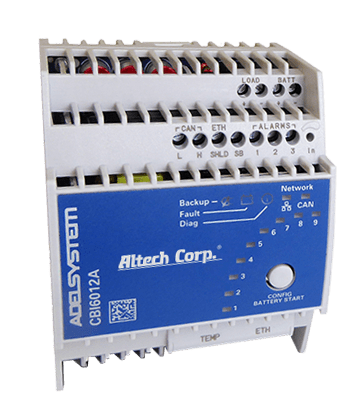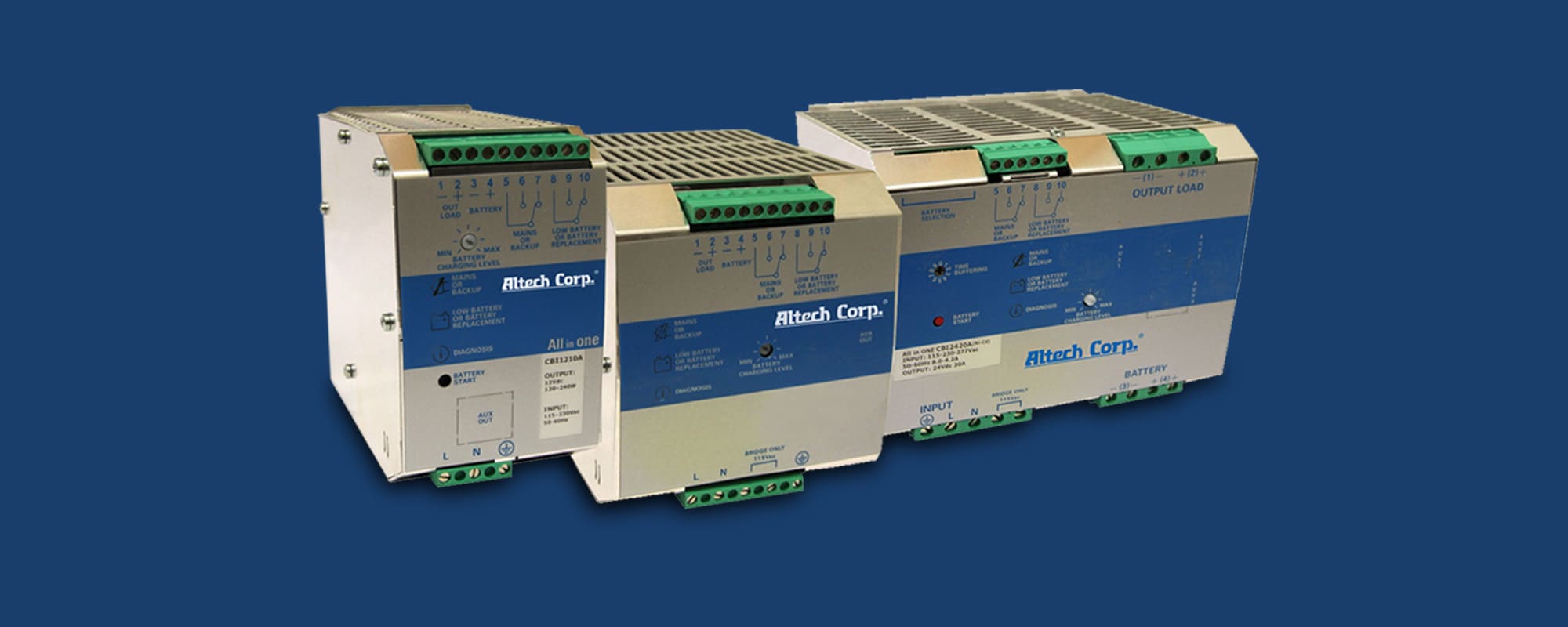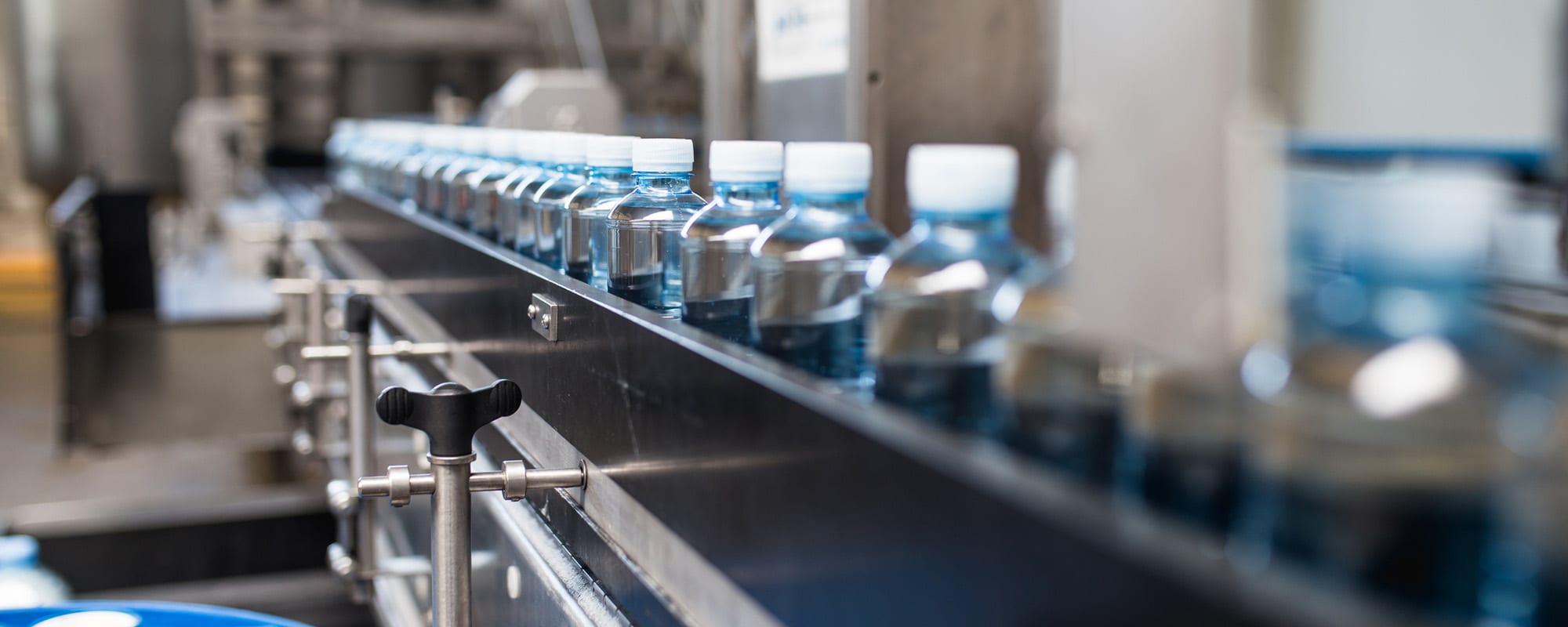Continuous power is essential for countless applications, so effectively guarding against outages is often vital. We spoke with Laszlo Gyorgypal, the Automation Product Manager at Altech, about the importance of power continuity and the uninterruptible power supplies and battery chargers key to providing reliable backup power in critical applications extending throughout the industrial manufacturing, telecommunications, healthcare, power generation, and transportation industries.
Continuous power is essential for daily life, industry, and infrastructure in our densely interconnected world. Interruptions ranging from minor outages to full blackouts can negatively impact operations of all kinds, so ensuring power continuity in even the toughest environments can have a big effect on overall success. We spoke with Laszlo Gyorgypal, Product Manager – Automation at Altech Corp, about the importance of power continuity, uninterruptible power supplies and battery chargers essential for providing reliable backup power in critical applications across various industries, key considerations for selecting power continuity solutions, and Altech’s portfolio of continuous power products.
Q1. Hi Laszlo. Please introduce yourself.

Hello. My name is Laszlo Gyorgypal. I’m a product manager and quality assurance manager at Altech Corporation and have been in the automation and control industry for over 35 years.
My interest in the automation industry and electrical power components dates back to my middle school years when, as a member of the electronics club, I was asked to help with a PA system installation at my school. I attended a technical high school to learn about electrical circuits and installations, creating a solid foundation for knowledge in that field, and then completed both a business management degree and an engineering degree at a leading European university. Since then, I have been involved in the design, manufacturing, testing, and commercialization of many electrical and mechanical products.
After building my career for almost 10 years in Europe, where I had been involved with product distribution for large- and mid-size component manufacturers, I moved to the United States and eventually joined Altech. They were a distributor for one of the companies I worked with in Europe, so it was a natural fit. At Altech, I took over several product lines as a product manager and created a strong DC power solutions group and product portfolio. In my current role, I manage Altech’s power solutions product portfolio, which includes uninterruptible power supplies (UPS), industrial relays, fuses, and manual pilot devices. I love working with customers to help them utilize the best available technology, and I enjoy working with suppliers to develop the new solutions that our customers demand.
Q2. Please also introduce us to Altech.
Altech specializes in providing electronic components and solutions. We design and develop a wide range of products, including terminal blocks, circuit breakers, enclosures, DC UPS systems, power supply products, and other components used in the industrial automation, automotive, machinery, and telecommunications industries. Our products are designed to meet industry standards and are used by professionals in these fields worldwide.
Q3. You joined us today to talk about power continuity. What is power continuity, and why is it important?
Power continuity refers to the reliable, uninterrupted supply of electrical power to devices, equipment, or systems — even if the main power source is lost — and helps ensure that critical electrical loads receive consistent and stable power without interruptions or disturbances. Shutting down equipment safely during power failures is crucial for preventing damage and data losses, minimizing downtime, and ensuring a smooth recovery when power is restored.
Products designed to maintain power continuity by providing backup power during outages or disturbances include UPS systems, battery chargers, standby generators, power distribution units (PDUs), automatic transfer switches (ATS), power inverters, and energy storage systems. These solutions maintain power continuity by providing backup power, voltage regulation, and protection against power disturbances and are available in a variety of options ideally suited to a wide range of system requirements and budgets.
Power continuity products are also often used in combination to provide complete power solutions capable of providing an uninterruptable electrical power supply to critical equipment, systems, and facilities in industries and applications with crucial continuous power demands. These types of applications include data centers equipped with critical IT infrastructure, telecommunications networks, like cell towers and communication hubs, medical facilities, industrial manufacturing facilities, financial exchanges, and transportation systems, including airports, railways, traffic control centers, and traffic signals.
Q4. Please tell us more about uninterruptible power supplies.

Uninterruptible power supplies (UPSs) are used to provide continuous power delivery, or backup power, for critical electronic devices and systems during power outages or voltage fluctuations, particularly in situations where mains power is unreliable or subject to interruptions. They are widely employed in settings where continuous power supply is non-negotiable and are ideal for applications including network infrastructure, data banks, healthcare facilities, industrial automation, transportation systems, power generation and distribution equipment, and public safety systems.
UPS systems are enabled by batteries that store energy designed to be quickly deployed to power connected devices when mains power isn’t available. In most cases, the anatomy of a UPS consists of a battery, a battery charger, and an inverter. When the mains power supply is available and stable, UPSs continuously charge their internal battery while simultaneously supplying power for connected devices to the load. In the event of a power outage or voltage irregularity, UPSs seamlessly switch to battery power, ensuring the uninterrupted operation of the connected equipment.
There are several different types and categories of UPSs. Some vary by power source. For example, AC UPS systems are powered by an AC voltage backup to the load, while DC UPS systems are either powered by AC voltage and provide a DC backup to the load or powered by DC voltage and provide DC power to the connected devices. Others have varying capabilities. For example:
- Offline or Standby UPSs are basic UPS systems that switch to battery power when the main power supply fails.
- Line-Interactive UPSs provide battery backup while also offering some level of voltage regulation and conditioning.
- Online or Double-Conversion UPSs provide continuous battery backup and voltage regulation and are the most advanced type of UPS.
- Hybrid DC UPSs combine features of offline, line-interactive, and online UPS systems to provide an optimal balance of performance, efficiency, and cost-effectiveness.
In addition, digital advancements are shaping the evolution of UPS systems and influencing their design, capabilities, and deployment. Some of the key application trends in UPSs include:
- Data Center Virtualization and Cloud Computing. The shift towards virtualized data center environments and cloud computing services has increased the demand for UPS systems that can scale to enable dynamic workloads and high-density computing infrastructure.
- The Internet of Things (IoT). A rise in edge computing devices and IoT deployments is driving the need for UPS solutions tailored to distributed computing environments, such as data centers, IoT gateways, and sensors.
- Smart Grid and Microgrid Integration. Smart grid and microgrid technologies are creating a need for UPS to support grid-tied operation, demand response programs, and grid stability functions.
- Remote Work and Digital Transformation. UPS systems are supporting remote work environments and digital transformation initiatives to enable distributed workforces, remote collaboration tools, and cloud-based applications.
Q5. What are some key considerations when selecting uninterruptible power supplies?
When selecting a UPS system, you should take several key considerations into account to ensure that you meet the specific requirements of your application. Important factors to consider include:
- Load Capacity. Determine the power requirements of the equipment you plan to connect to the UPS and choose a system with a load capacity capable of supporting all connected devices.
- Topology. Different UPS topologies offer various levels of protection and efficiency. Select a UPS topology that best suits the needs of your application in terms of reliability and performance.
- Battery Type and Runtime. Consider the type of battery used in the UPS and its capacity to provide backup power during an outage. Choose a UPS with a sufficient battery capacity to support the required runtime for your load.
- Management and Monitoring Features. Evaluate the management and monitoring capabilities of the UPS, including remote management, monitoring software, and built-in communication interfaces.
- Budget and Total Cost of Ownership (TCO). Consider the initial purchase price, installation costs, and ongoing maintenance expenses when evaluating UPS options. Calculate the TCO over its expected lifespan to make an informed decision based on upfront costs and long-term value.
Choosing to work with a proven DC UPS supplier, like Altech, or one of our trusted distributors, like RS, can also help can ensure that your power protection needs are met with reliable, high-quality UPS solutions tailored to your specific requirements.
Q6. You mentioned that battery chargers are a critical component of UPS systems. Please tell us more about battery chargers.
Battery chargers are designed to replenish the energy stored in rechargeable batteries. They convert AC supply voltages from an external power source, like an outlet, into the DC voltage needed to charge a battery and, in many applications, eliminate the need to replace disposable batteries and use generators. They can also function as a power supply, particularly when designed into UPS systems. Other common applications for battery chargers include consumer and industrial electronics devices, like smartphones, laptops, barcode readers, and tablets.
Battery chargers supply electrical energy to rechargeable batteries in a controlled manner, typically through a multi-stage process that incorporates a bulk charge, absorption charge, and float charge. There are several types of battery chargers to be aware of when considering the market, and each is designed for specific types of batteries and applications.
- Linear Battery Chargers use a linear regulator to control the charging voltage and current. They are relatively simple and inexpensive but can be less efficient compared to other types of chargers.
- Switch-Mode Chargers, also known as switching chargers, use high-frequency switching circuits to regulate the charging voltage and current and are the most common type of battery charger on the market. These chargers are more efficient than linear chargers and can also handle higher power levels. They’re often used in portable electronic devices, power tools, and electric vehicles.
- Inductive or Wireless Chargers use electromagnetic induction to wirelessly transfer energy from the charger to the battery. They are commonly used for charging smartphones, smartwatches, and other small electronic devices.
- Solar Chargers use solar panels to convert sunlight into electrical energy, which is then used to charge batteries.
There are also several industry trends and customer demands that are shaping the development, design, and application of battery chargers, including:
- Portable Electronics and Wearables. The explosion of smartphones, tablets, laptops, and wearable devices has fueled demand for compact, lightweight battery chargers with fast charging capabilities.
- Energy Storage Systems (ESS). Battery chargers are critical in energy storage systems used for grid stabilization, renewable energy integration, and backup power applications.
- IoT Devices. The spread of Internet of Things (IoT) devices and sensors powered by rechargeable batteries require efficient and low-power battery charging solutions and must offer low standby power consumption along with wide input voltage ranges.
- Emergency Preparedness and Disaster Response Systems. Chargers are essential for emergency preparedness and disaster response efforts, providing a reliable source of power for critical communication devices, emergency lighting systems, and portable medical equipment.
- Video and Security Monitoring Systems. Video monitoring systems are used for various purposes, including public and home security surveillance, monitoring industrial facilities, and traffic management. They can help deter criminal activity, provide evidence in the event of a security breach, and enhance overall safety and security.
Q7. Are there any key characteristics that customers should look out for when they’re evaluating battery chargers?
Effective battery chargers possess physical and electrical characteristics that ensure safe, efficient, and reliable charging. Key characteristics include:
- Compact, Portable, and Durable Constructions designed to provide space savings in high-density consumer and industrial electronics applications and capable of withstanding the hazards common to various operating environments.
- User-Friendly Interfaces with displays, buttons, or indicators that provide easy-to-read information about the charging process.
- Integrated Safety Features designed to protect against overcharging, short circuits, reverse polarity, temperature monitoring, and other risks.
- Compatibility with a wide range of battery types, sizes, charging voltages, current levels, and chemistries, including lead-acid, lithium-ion, and nickel-metal hydride batteries.
Q8. What’s unique about Altech’s power continuity products?
Altech is globally known and respected for its high-performance UPS, power, and automation solutions, and our UPS products provide several advantages over competing UPS products, including:
- Integrated Solutions. Altech’s UPS products seamlessly integrate with other power and automation components to provide users with a comprehensive solution for their power protection needs.
- Quality and Reliability. Our UPS products are designed and manufactured to meet stringent quality standards and deliver robust performance and durability in especially demanding environments.
- Customization and Engineering Support. We provide customization services and engineering support to tailor our UPS solutions to customers’ specific application requirements.
- Technical Expertise. The Altech team possesses proven expertise and deep technical knowledge of UPS technology and applications and offers valuable guidance and assistance for customers selecting, installing, and maintaining UPS systems to ensure optimal performance and reliability.
- Cost-Effective Solutions. Our portfolio of UPS products provides value without compromising on quality or performance.
Q10. Tell us about Altech’s CBI Series Uninterruptible Power Supplies.
Altech’s CBI Series DC UPS products are all-in-one devices that include a power supply, battery charger, battery management system, and backup module, as well as integrated smart battery management firmware designed to optimize the available power by automatically allocating it to both the load — its top priority — and the battery. This automatic, multi-stage operation optimizes and adapts to the battery status to provide a continuous power supply to the load and prevent the load output from being affected by battery conditions.

The series also features a range of input voltage ratings (110, 230, and 277VAC), output voltage ratings (12, 24, and 48VDC), and current ratings (3–35A) for broad application suitability, as well as a variety of advantageous battery capabilities. These include:
- User-Selectable Charging Curves that facilitate compatibility with virtually all battery types, including lead acid, sealed lead acid, gel, nickel-cadmium (NiCd), nickel-metal hydride (NiMH), and lithium ion (Li-ion) batteries.
- Automatic, Multi-Stage Charging Operations with real-time diagnostics that enable the fast recharge and recovery of deeply discharged batteries, which adds real value and reliability to the systems hosting these DC UPS devices.
- An Adjustable Maximum Battery Charging Current that can be set from 10–100% of the device’s rated value.
- A Battery Start Function that allows users to restart the system with mains AC power is off.
Additional CBI Series features include compatibility with various communication protocols, such as Ethernet SNMP V3, Modbus TCP/IP, and HTTPS, LED indicators and relay contacts that clearly communicate system status and support troubleshooting processes, DIN-rail and wall-mount installation options, UL recognition, CE markings, and RoHS and REACH compliance.
Q9. Tell us about Altech’s CB Series Battery Chargers.

Altech’s CB Series battery chargers incorporate an array of advanced features, including multi-chemistry charging capabilities that support different types of batteries for broad application suitability, integration support for remote monitoring and control systems that allow users to modify charging parameters from anywhere with an internet connection, and high-efficiency charging algorithms and power conversion techniques engineered to minimize energy waste and reduce operating costs. CB Series battery chargers are also available with 12V and 24V output ratings and 110, 220, and 277V universal input ratings and are equipped with built-in protection mechanisms that reliably prevent overcharging, over-discharging, short circuits, and other potential issues that can damage batteries or host systems. Additional features include a modular, scalable design that makes it easy for users to accommodate changes in power system infrastructure and requirements and compliance with relevant industry safety, reliability, and performance standards.
Q11. Are there any success stories you’d like to share about Altech’s CBI Series Uninterruptible Power Supplies or CB Series Battery Chargers?
There are countless instances of successful installations of Altech CB battery chargers and CBI DC UPS units. These product lines have been around for over 20 years and are implemented in a variety of industries and applications, including power continuity systems, industrial machinery, construction equipment, alternative and renewable energy installations, fire protection systems, auxiliary power supplies, elevators, hospitals, transportation systems, water treatment plants, telecommunications and wireless internet service provider (WISP) systems, remote terminal units (RTUs), IoT networks, environmental monitoring systems, and building automation systems. Our products help power the infrastructure that each of us depends on either directly or indirectly every day.
Q12. Is there anything else you’d like RS customers to know about Altech or its power continuity solutions?

Yes! We recently launched our newest addition to the Altech DC UPS line, the CBI60W Series, which is designed for building automation applications, supports Ethernet SNMP, Modbus TCP/IP, and HTTPS communications protocols and a variety of different charging profiles — including lead acid, absorbed glass mat (AGM), gel, NiCd, NiMH, Li-Ion, and lithium ion phosphate (LiFePO4) battery technologies — and can be connected to gateways and switches to provide users with easy access to battery status, DC-UPS functions, and other application data. The new CBI60W DC UPSs are currently available in two Protection Class II models — the 12V, 5A CBI6012A and 24V, 2.5A CBI6024 — that feature single-phase AC inputs rated for 90–305VAC and use switching technology equipped with microcontrollers to optimize the loading and unloading times of the battery without a deep discharge. They also switch from the battery to the charger without any interruption, enabling automatic protection against reverse polarity, short circuits, overload, and overvoltage without a fuse. In addition, we’re planning to launch a larger 600W system with the same communication protocol capabilities, similar features, and 25A/24V and 12A/48V ratings later this year.
Boost Confidence in Your Power Continuity with Altech and RS
Altech Corporation is a trusted ISO 9001-certified supplier and distributor of electronic and control components optimized for use in a wide range of industries and backed by 40 years of proven design and development experience and a team with vast technical acumen and a global reputation for efficient and effective customer service. The Altech product portfolio offers solutions extending from connectors, wire and cable, and circuit protection devices to switches, relays, sensors, industrial controls, test and measurement, lighting and indication, power products, and enclosures, racks, and cabinets — all of which are available at RS.
For more information about the extensive RS selection of Altech products, including uninterruptible power supplies and battery chargers engineered to provide reliable power continuity in a variety of application environments with various requirements, please visit the links embedded here. For assistance identifying, procuring, deploying, and maintaining Altech power products sure to satisfy your unique application demands and provide you with peace of mind about your power continuity performance, please contact your local RS representative at 1.866.433.5722 or reach out to the RS technical support team.







